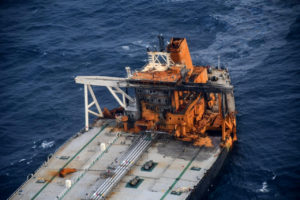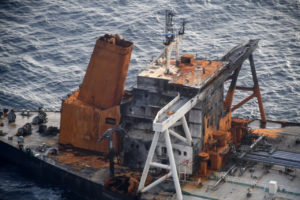Three members of the international salvage team today boarded the MT New Diamond oil tanker after confirmation that the fire was now under control, Navy spokesman Indika de Silva said.
He said that the area of the vessel boarded by the expert team was safe.
Meanwhile, the rescued oil-tanker crew who were stationed in the Hambanthota port were transported yesterday (8) to Galle, where PCR tests were carried out and transferred to a hotel in Galle for isolation.
The Sri Lanka Air Force (SLAF) in a statement said the situation on board the MT New Diamond Oil Tanker as at 7.30 a.m. today (September 9, 2020) shows that the fire and smoke which was clearly visible from the air has subsided.
The Air Force further said:
The mission of dousing the fire which irrupted on board the oil tanker commenced on September 3, 2020 with the SLAF Beech King B200 aircraft being the first to arrive at the location of the tanker which was at that time 38 nautical miles off Sangamankanda Point east of Sri Lanka.
This gallant mission which will be of historical significance to the SLAF was undertaken on the instructions of the Commander of the Air Force, Air Marshal Sumangala Dias under the continuous guidance of the Director of Air Operations, Air Vice Marshal Ravi Jayasinghe.
To date, SLAF has conducted 176 flying missions and dropped 440,000 liters of water on to the blazing tanker. In addition, SLAF helicopters also dropped a total of 4,500 Kgs dry chemical powder on to vital areas of the tanker, the statement said.
The success of this historical mission is a combined effort by the Sri Lanka Navy, Sri Lanka Department of Coast Guard, Indian Navy, Indian Coast Guard, Sri Lanka Ports Authority and various other stake holders in the region.
During the 7 days of this operation, a Beech King B200 aircraft from the No 3 Maritime Squadron, MI-17 helicopters from the No 6 Helicopter Squadron, Bell 212 helicopters from the No 7 Squadron and Y-12 aircraft from the No 8 Light Transport Squadron have conducted 176 flying operations spanning over 100 flying hours. It must be mentioned that these daring flying operations were carried out amidst extreme adverse weather conditions and special mention should be made on the dropping of dry chemical powder (DCP) which was done at very low altitudes in order to achieve precise drops on vital areas of the tanker. This is the first and only occasion to date where SLAF helicopters have dropped DCP on to a blazing tanker, the SLAF said.

|

|

|

|

|
Leave Comments